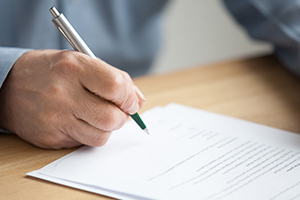What Is a Deposition?

In the simplest terms, a deposition is a question and answer session with the person (referred to as a witness or “deponent”) providing answers under oath.
Here is a more detailed explanation. After a lawsuit is filed, the next phase of the lawsuit process is called “discovery.” During the discovery phase of a lawsuit, lawyers are gathering evidence. As more evidence is gathered, the parties develop a better understanding of the strengths and weakness of their case, which helps either push the case to a dismissal, a settlement or trial. Depositions are a critical part of evidence gathering.
Either party to a lawsuit (either the plaintiff or the defendant) can request a deposition of the other party or witness pursuant to Tennessee Rule of Civil Procedure 30 and 45. For instance, in a car accident case, if the case proceeds long enough without settling, both drivers involved in the wreck will get deposed. Other depositions might include witnesses to the wreck, the investigating police officer, the medical personnel who treated the injury victim, etc.
Parties to the case must appear for a deposition without a court order (called a “subpoena”) but other parties will usually be subpoenaed to appear for the deposition. Subpoenas are issued by the court clerk and must indicate the date and time of the deposition as well as the place where the deposition will be held. It should also indicate whether the deposition will be videotaped. The subpoena may require you to bring documents or other tangible items to the deposition. (For more information about responding to subpoenas, please visit our Do I Have to Respond to a Subpoena page.) You may bring your own lawyer to the deposition if you so choose. If you are a party to the lawsuit, your lawyer will prepare you for the deposition and will attend the deposition with you.
On the day of the deposition, use you should dress appropriately. We generally tell our clients to dress as if they were going to court or church. Refrain from t-shirts, ballcaps, etc. Be sure to arrive on time, if not a little early, for the deposition. Most depositions take place in a lawyer’s conference room, although they can be held at other locations if convenience dictates it. The witness and the lawyers will sit at a table and a person called a “court reporter” will swear the witness in. In other words, the witness will swear or affirm to tell the truth during the deposition under penalty of perjury, just as if the witness was testifying in court. The court reporter or stenographer will record every word that is said on the record during the deposition by the witness and the lawyers. If a videographer is present, he or she will also video the proceedings and that video may be played to the judge or jury later in the case.
Once the witness is sworn in, the lawyer who issued the subpoena or noticed the deposition proceeds first and the other lawyers follow. Generally, the lawyer will review the ground rules of the deposition before questioning. Standard ground rules are as follows:
- The witness’ responses should be yes or no instead of uh-huh and uh-uh. This is simply to avoid confusion and increase clarity.
- The witness’ responses must be verbal. In everyday conversation, we often nod our heads to indicate our answer, but the record must be clear for the court reporter who is taking down the questions and responses.
- The witness should allow the lawyer to finish the question before responding. Again, in everyday conversation, we often know what a person is asking and will answer before they finish. In a deposition, this is dangerous for two reasons: first, the witness may guess wrong and then their answer may not be correct. Second, when two people are talking at once, it makes it difficult for the court reporter to get an accurate transcript.
- If you do not understand a question, you must speak up and let the attorney asking the question know that you do not understand it.
- If during the course of a deposition you remember a fact that changes a previous answer, you should alert the lawyers during the deposition.
- If you need to take a break at any time during the deposition, simply indicate that you need to do so, and the parties will go off the record to allow time to use the restroom, make a phone call or get a drink, etc.
At the conclusion of the deposition, you will be given the right to read the transcript and correct errors. Importantly, you are not permitted to change the substance of your response. For instance, you cannot change your testimony to say that the light was green instead of red. You are only permitted to correct any errors in the transcription by the court reporter. If you do not wish to read the deposition, you can “waive” (that is, give up the right to place your signature on the deposition). Unless something peculiar happens during the deposition, most witnesses choose to waive signature.
If the case proceeds to trial, your deposition may be used as substantive evidence if you are unavailable (the lawyers will read portions of your deposition to the judge or jury) or the deposition will be used for impeachment. Impeachment occurs if your deposition testimony is different from your trial testimony. For instance, if you said in the deposition that the light was green but at trial you say the light is red, then the lawyer will use the deposition transcript to show that, for whatever reason, you have changed your testimony.
In closing, while depositions can understandably cause some stress, most lawyers try to minimize the inconvenience and will reschedule them (if it is necessary and deadlines permit) and will treat witnesses with civility and respect. Good lawyers prepare their clients for depositions.
